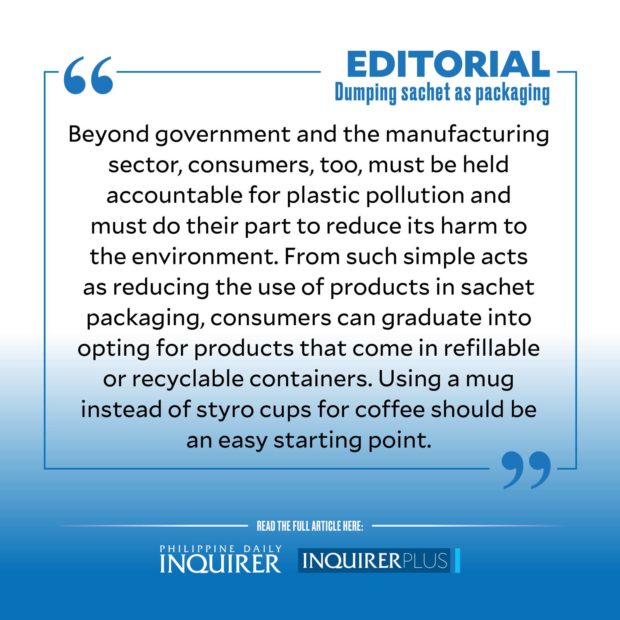Last week, respected environmental activists, leaders of nongovernment organizations, as well as government and private institutions issued an urgent and timely public call for Filipinos to “break up” with sachets, those small, single-use plastic packaging used for practically everything—from shampoo to soap, toothpaste, cooking oil, and instant coffee.
Single-use plastics, mainly sachets, are so much a part of Philippine households that, according to a study by the Global Alliance for Incinerator Alternatives (Gaia), they account for half of the country’s plastic waste, 20 percent of which end up in the ocean, posing a significant risk to those who consume seafood. Sachets also expose coastal communities to contaminated water supply and flash floods due to clogged waterways.
As the United Nations Environment Programme noted, the world has become “addicted” to single-use plastics—those meant to be thrown away after a brief single use. Sachets have become such an integral part of everyday life that they have resulted in “severe environmental, social, economic and health consequences.”
This explains why some 29 individuals and leaders, including French ambassador Michèle Boccoz, Commissioner Rachel Herrera of the Climate Change Commission of the Philippines, former Ifugao representative Teddy Baguilat Jr., and Save the Philippine Seas cofounder Anna Oposa have issued a manifesto calling on government to legalize and mainstream the refilling of products, starting with toiletries, to start the journey toward a “sachet-free future.”
The signatories said encouraging a refilling system for widely used products, especially among variety or sari-sari stores where 67 percent of Filipinos buy their everyday needs, can serve as a starting point that “can spark significant change” in sustainable packaging for household products and “enable [consumers] to … further reduce their plastic footprint.”
As consumers, the signatories pointed out “the extensive effect of sachet pollution not just on the environment but also on the overall quality of human life,” not just in one’s community and workplace, but also on “the health and the well-being of families and loved ones.”
Mainstreaming the practice of refilling would be an opportunity as well for the Philippines to fulfill its commitments under the Paris agreement concerning climate mitigation and adaptation, and for businesses to be able to support this path to sustainability, the signatories added.
“We believe that we can make change happen when we take to heart the critical statistics on sachet pollution, consider its human impact, listen to science and the call of those at the grassroots level, and collaborate to find the most affordable, accessible, and sustainable alternatives,” the manifesto stated.
Back in 2019, Gaia released the findings of its five-year trash audit covering 21 sites across the Philippines, and revealed that the average Filipino uses 591 pieces of plastic sachets every year.
“The problem is the huge amount of single-use plastics being produced—not just the way waste is managed,” said Froilan Grate, executive director of Gaia Asia-Pacific, one of the signatories of the manifesto.
This and other disturbing findings prompted the No Other Year for Plastics coalition convened by MakeSense Asia and its partner organizations to appeal to corporations and manufacturers to provide “a more sustainable and Earth-friendly alternatives to sachets,” while urging consumers to reduce their own purchase of products in sachets.
Sen. Pia S. Cayetano, chair of the Senate committee on sustainable development goals, innovation and futures thinking, voiced the same concerns in August and prodded her Senate colleagues to stop using plastic bottles and sachets. Quoting the 2019 Gaia study, she revealed that almost 164 million pieces of sachets are discarded in the Philippines daily, or around 59.7 billion yearly, choking the country’s waterways and drainage systems.
With the chorus of voices urging an end to the use of sachet packaging growing louder, the government crafted the Extended Producer Responsibility Act, which lapsed into law in July. The law amends the 21-year-old Ecological Solid Waste Management Act that required large manufacturing companies to take responsibility for the impact of their products on the environment over the products’ entire life cycle—from manufacturing to use, and eventual discard.
But beyond government and the manufacturing sector, consumers, too, must be held accountable for plastic pollution and must do their part to reduce its harm to the environment. From such simple acts as reducing the use of products in sachet packaging, consumers can graduate into opting for products that come in refillable or recyclable containers. Using a mug instead of styro cups for coffee should be an easy starting point.
As Cayetano stressed in her privilege speech, change that will benefit the environment and end the scourge of plastic “starts with day-to-day habits, day-to-day changes [that] seem small at first, but collectively and over time, [would] result in big changes.”


